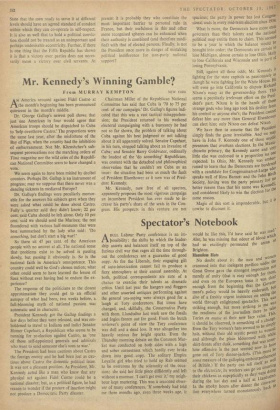Mr. Kennedy's Winning Gamble?
From MURRAY KEMPTON NEW YORK N America aroused against Fidel Castro at the month's beginning has been pronounced quiescent in the month's middle.
Dr. George Gallup's newest poll shows that just one American in four would agree that American troops should be dispatched to Cuba to 'help overthrow Castro.' The proportions were the same last year, after the misfortune of the Bay of Pigs, when the country had the inhibition of embarrassment. Not Mr. Khrushchev's sub- sequent provocations nor the marching orders of Time magazine nor the wild cries of the Republi- can National Committee seem to have changed a vote.
We seem again to have been misled by decibel counters. Perhaps Dr. Gallup is an instrument of progress; may we suppose that there never was a dancing sickness in mediaeval Europe?
Dr. Gallup's findings were peculiarly memor- able for the answers his subjects gave when they were asked what could be done about Castro. Fully a quarter said they didn't know; 22 per cent. said Cuba should be left alone. Only 10 per cent. said we should send the Marines; the rest floundered with various half-measures that were best summarised by the lady who said: 'Do something, but don't start a big war!'
So there sit 47 per cent. of the American people with no answer at all. The national sense that problems exist to be solved is passing slowly, but passing it obviously is. So is the national faith in America's omnipotence. This country could well be God's chosen nation; what other could seem to have learned the lesson of Suez without ever having had to endure the ex- perience?
The response of the politicians to the closest approximation they could get to an official autopsy of what had been, two weeks before, a full-blooming myth of national passion was automatic and in character.
President Kennedy got the Gallup findings a few days before they were released, and was em- boldened to travel to Indiana and indict Senator Homer Capehart, a Republican who seems to be running for re-election against Castro, as 'one of those self-appointed generals and admirals who want to send someone else's sons to war.'
The President had been cautious about Castro the foreign enemy and he had been just as cau- tious about Castro the domestic political issue.
It was not a pleasant position. As President, Mr. Kennedy acted like a man who knew that any physical act against Fidel Castro could be a national disaster; but, as a political figure, he had reason to wonder if the posture of inaction might not produce a Democratic Party disaster. Chairman Miller of the Republican National Committee has said that Cuba is '70 to 75 per cent. of our campaign.' Dr. Gallup's figures indi- cated that this was a vast tactical misapprehen- sion; the President returned to his weekend electoral campaigning with a buoyancy he had not so far shown, the problem of talking about Cuba against his best judgment or not talking about it all apparently solved. Senator Capehart, in his turn, stopped talking about an invasion of Cuba; and Senator Barry Goldwater, ordinarily the loudest of the `do something' Republicans, was content with the detached and philosophical observation that he couldn't see Cuba as an issue: the situation had been as much the fault of President Eisenhower as it now was of Presi- dent Kennedy.
Mr. Kennedy, now free of all spectres, apparently proposes the most vigorous campaign an incumbent President has ever made to in- crease his party's share of the seats in the Con- gress. His prospects in this venture are not spacious; the party in power has lost Congres• sional seats in every mid-term election since 1934.
What is more, the Democrats have more state governors than their talents and the national political map entitle them to claim. This seemed to be a year in which the balance would be brought into order; the Democrats are certain 10 lose Michigan, almost certain to lose Ohio, likely to lose California and Wisconsin and in peril Of losing Pennsylvania.
Still, against all these odds, Mr. Kennedy IS fighting for the state capitols as passionately as though he were fighting for the White House. He will even go into California to dispute Ricbard Nixon's essay at the governorship there. This seems a peculiarly irrelevant effort on the Presi- dent's part; Nixon is in the hands of those strange gods who long ago took his destiny from, his control or anyone else's; the President cannot defeat him any more than General Eisenhower can elect him; only Nixon can defeat Nixon. We have then to assume that the President simply finds the game irresistible. And we may have in John F. Kennedy one of those mystic presences that overturn elections. In the Massa- chusetts primary, the Kennedy name and ver)/ little else was endorsed to a proportion no one expected. In Ohio, Mr. Kennedy was enlbar: rassed to learn that the Democrats are burdened with a candidate for Congressman-at-Large Wir speaks well of Ross Barnett and the John Bircll Society, having won the party primary for no better reason than that his name was Kennedy' and considered likely to win the election for the same reason. Magic of this sort is imponderable, but it is unwise to discount it.














































 Previous page
Previous page